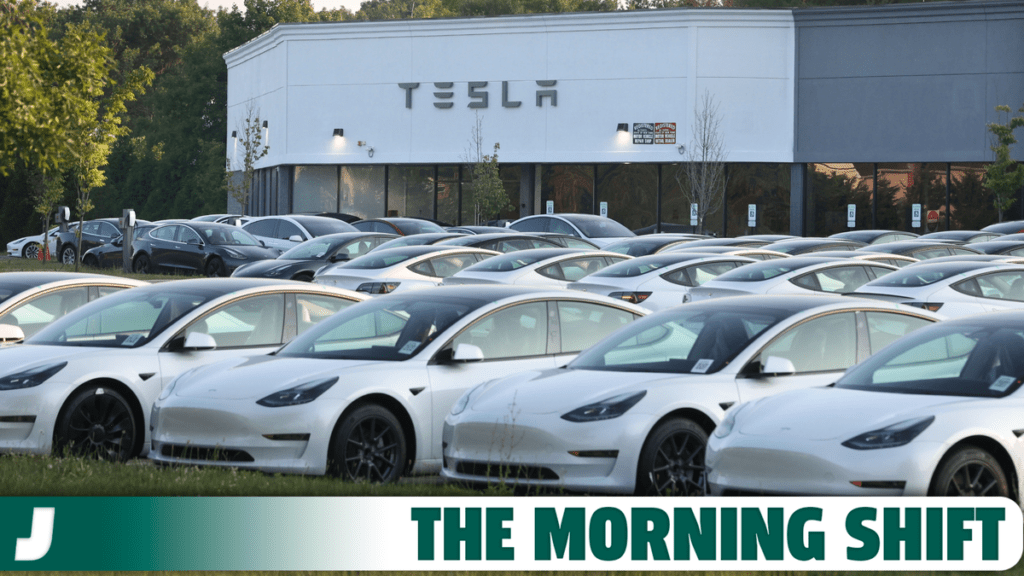Nearly 2 Million EVs Have Been Sold In The U.S. This Year

Good morning! It’s Wednesday, December 6, 2023, and this is The Morning Shift, your daily roundup of the top automotive headlines from around the world, in one place. Here are the important stories you need to know.
Nissan Finally Turns a Profit
1st Gear: EVs Sales Are Actually Pretty Decent
Jalopnik and other outlets have written a lot about how EV demand is slowing, but as it turns out, the data just doesn’t support that line of thinking… yet.
Passenger EVs are on pace to hit 14 million sales this year around the world. That’s a 36 percent increase from 2022. Even in the U.S., where most EV demand concerns seem to lie, sales are growing exponentially and will be up 50 percent this year to nearly 2 million units. It may be short of what some manufacturers were hoping for, but it’s still very healthy growth.
All in all, it looks like U.S. consumers are on pace to buy 1.9 million electric vehicles in 2023. That represents about nine percent of the new car market. From Bloomberg:
A slowdown could still be coming, but for now, this looks much more like a winnowing down of who is competitive in the market than a general drop-off in demand.
Pure-play EV makers such as Tesla, BYD and Li Auto will capture 7% of the global vehicle market this year, up from just 1% in 2020. Many legacy automakers have launched products that are not competitive on price, range or features and will have to go back to the drawing board.
EV adoption is rising quickly in emerging economies including India, Thailand and Indonesia, where low-cost models are driving demand.
EVs are already 9% of cars sold in Thailand — an adoption rate similar to the US — which runs counter to the argument that EVs are only a rich-country phenomenon. The numbers are still modest overall, but the growth rate is encouraging in these fast-growing auto markets. With more new models in the $10,000 range hitting the market, growth should continue.
The Inflation Reduction Act has apparently helped spark about $100 billion in newly announced investments in EV and battery manufacturing.
It’s still a bit of an uphill battle for EVs, though.
Automaker announcements also have stalled. A total of 18 carmakers of various sizes have announced net-zero commitments, targeting 2050 or sooner. These automakers represent 54% of the global passenger-vehicle market, but not all of them have clarified whether their targets will cover the vehicles they sell or just their own operations. The number of companies formally committing to ending sales of new combustion vehicles is smaller and covers 32% of global sales.
No new automakers announced net-zero or combustion-vehicle phase-out commitments in 2023, and some, including Ford and General Motors, moved their near-term EV targets back this year, citing lower-than-expected demand.
So, EV adoption and execution still have a bit of a way to go in the U.S. and around the world, but at least it looks like the EV doomers out there will have to wait a while longer to say, “I told you so.”
2nd Gear: Lamborghini Goes Woke
After reaching a deal with its unions, Lamborghini is introducing a four-day work week for its production workers. The deal comes as more companies examine the structure of their employees’ work week. From Reuters:
The FIOM and FIM-CISL unions said the agreement is “historical” as it is the first in the automotive industry in Europe to achieve a significant reduction in working hours without cutting wages, but rather increasing them.
The move comes at a time when many companies and public offices are changing how people work to improve employee well-being and promote company savings after the COVID-19 pandemic and rising costs.
Similar four-day week schemes adopted in other European countries, such as Britain, have found that employees worked more in less time, job retention and recruitment improved and sickness levels went down.
“Work less and work better, this is the principle that guided this negotiation, and which is part of a comprehensive reasoning,” a statement from FIOM and FIM-CISL said.
Production employees will work on a rotating two-shift schedule. They’ll alternate a five-day week with a four-day week. It’ll end up cutting 22 days of work each year. Folks on a three-shift rotation, which includes nights, will have. a five-day week alternated with two four-day weeks. That’ll cut their yearly working days by 31.
The agreement reached with Lamborghini is part of a broader renegotiation of the framework contract used for workers of the car maker, a subsidiary of Germany’s Volkswagen (VOWG_p.DE), which also includes 500 new jobs, an increase of annual wages and further labour benefits.
In terms of pay, the deal includes a 50% increase in the current variable bonuses paid to workers as well as a one-off bonus of over 1,000 euros ($1,082) to be paid this month.
That’s some really good news for Lamborghini employees who have been churning out vehicles at a record pace. I’d just make sure the Lambo I bought wasn’t made on the Monday after or the Friday before a three-day weekend.
3rd Gear: GM Isn’t Vibing With Work From Home
General Motors has decided its salaried employees have slightly too much of a quality of life, and because of that, all 43,500 workers across the U.S. must return to the office on a part-time basis. From The Detroit Free Press:
In a company-wide email to employees Tuesday morning that was obtained by the Detroit Free Press, CEO Mary Barra made it clear she wants white-collar workers at their desks inside GM facilities on three specific days of each week “at a minimum.”
“At the start of the year, we asked hybrid employees to be in the office three days a week in order to drive the greatest impact. However, adherence has been mixed,” Barra wrote in the email. “We are now explicitly requesting hybrid employees to be onsite beginning Jan. 8, every Tuesday, Wednesday, Thursday at minimum. Senior leaders will continue to have the flexibility to determine if a team needs to be in the office more frequently.”
GM spokesman Kevin Kelly confirmed the new policy saying it is to help the automaker accelerate its move to selling more electric vehicles in the future. GM struggled this year to get its new EVs launched as it battled battery production problems. Barra told investors she was “disappointed” in this year’s slow EV launches and that GM has fixed the battery production problems and GM will have stronger EV sales next year.
“We’re going through a historical transformation around the business,” Kelly told the Free Press. “This (new policy) is a way to get more collaboration around that transformation.”
This is not the first time GM and Barra tried to get employees back in the building like it was 1967 or something.
Many salaried workers at GM have resisted the return to the office policy. In September 2022, in internal messages to employees, GM first said it would end its Work Appropriately philosophy, which allowed for flexibility on where employees did their job, and require them to come to the office three days a week.
Days later, after much employee pushback, Barra sent out a note to the salaried workforce offering an apology of sorts for the short timing in announcing the new policy. She said GM’s plan still would include a more regular, in-person presence, but it would not implement any return-to-the-office policy in 2022 as the company listens to employee feedback.
[…]
Tuesday’s news is GM’s move to better define its return-to-the-office policy by naming the specific days leadership wants people to come into the office, Kelly said. By choosing Tuesday, Wednesday and Thursday as those days, it allows for managers to give employees flexibility around the weekends by determining if their team can work hybrid on Mondays and Fridays, he said.
In Tuesday’s memo, Barra said, “We realize ‘return to the office’ is a topic that has been highly debated in many workplaces around the country. It is also something the SLT (senior leadership team) feels strongly about, and we want to make our expectations clear. We believe the benefits of in-person collaboration and mentorship lead to a stronger, more innovative culture and higher performance.”
GM won’t be tracking badge swipes into its facilities. Instead, it’s going to be up to individual team leaders to enforce the policy.
Those lucky bastards.
4th Gear: Nissan, Mitsubishi Invest In Renault’s EV Unit
Renault’s alliance partners, Nissan and Mitsubishi, have confirmed plans to invest in the French automaker’s electric vehicle unit, called Ampere. The companies will use it to develop EVs for the European market. From Reuters:
After years of contentious partnership, the announcement on Wednesday confirms that the new alliance between the three automakers is smaller and more pragmatic, focusing on regional cooperation.
Nissan and Mitsubishi confirmed they would invest respectively up to 600 million euros ($647.46 million) and 200 million euros in Ampere, which has been carved out from the rest of Renault and is due for a public listing next year.
Nissan will become “a strategic investor” in Ampere, Makoto Uchida, CEO of the Japanese car marker told reporters, adding the company may use the EV unit’s software and connectivity innovations in other markets outside Europe.
“Developing electric vehicles all over the world alone would be very challenging,” he said.
Ampere will develop and manufacture an electric version of the compact Nissan Micra for the European market and a medium-sized electric SUV for Mitsubishi.
Renault CEO Luca de Meo said Ampere will cut the costs for the Micra for Nissan by 50%.
The alliance partners also confirmed their joint projects in Latin America and India.
Back in September, Renault, Nissan and Mitsubishi ended their common purchasing agreement. The trio said the move would allow them to focus on individual projects and “adapt more quickly” to regional differences in automotive markets.
Then, at the end of July, Renault and Nissan finalized terms to restructure their alliance after months of negotiations.
Reverse: That’s A Penis
Neutral: Hell Yeah, Dude
Photo: Andy Kalmowitz / Jalopnik
Look at this beast. It’s beautiful.
On The Radio: Bing Crosby – “White Christmas”
White Christmas (1947 Version)
Bing is my goat. Argue with a wall.




